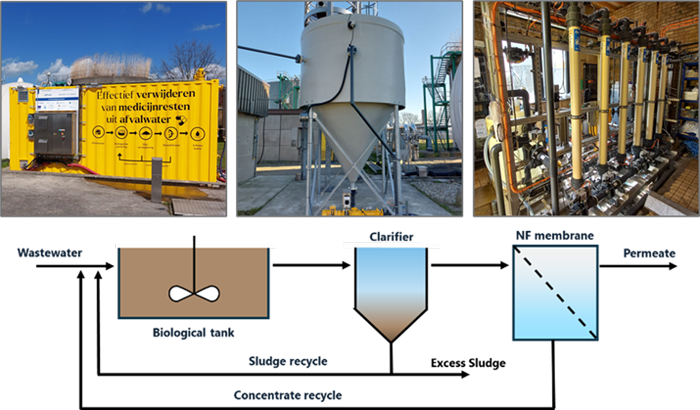Removal of micropollutants from wastewater through nanofiltration and concentrate recirculation: a pilot-scale study at WWTP Enschede-West
- Persons involved: Mostafa Elshourbagy (PhD), Walter van der Meer (promotor), Antoine Kemperman (Supervisor), Sander Haase (Daily Supervisor)
- Duration: 2024-2028
- Funding: TKI Watertechnologie
- Partners: Wageningen University, Stichting Toegepast Onderzoek Waterbeheer (STOWA), KWR Water Research Institute, Water board Vechtstromen, Water board Vallei en Veluwe, Water board Rijn en IJssel, Water board Aa en Maas, NX Filtration, Nijhuis Water Technology, Royal HaskoningDHV, Oasen
Introduction
Every year, significant amounts of pharmaceuticals and other organic micro-pollutants (OMPs) end up in our wastewater and ultimately also in the surface waters. This poses a risk to public health and the aquatic environment. Ultimately, these compounds may even end up in our drinking water. Therefore, wastewater treatment plants (WWTPs) will need to expand their treatment process with an additional treatment step (a fourth stage) to remove OMPs from the wastewater. However, it is not yet clear what the most suitable technology is. Moreover, to prevent even more drought and pressure on the (drinking) water supply, the water cycle should be closed. This means that in the future part of the WWTP effluent will have to be reused as a water source. This forms an additional challenge.
Keywords
Organic Micropollutants (OMPs), Nanofiltration, Recirculation, Pilot-scale
Technological/Scientific challenges
Using nanofiltration (NF) technology for retaining and removing OMPs (> 85%) from wastewater is a good opportunity for producing a clean permeate stream. Considering the removal efficiency, the permeate may even be, probably after some additional treatment, be valorised. Dealing with the concentrate(d) stream containing the OMPs remains a challenge though.
Research goals/research questions
This project focuses on determining the extent of which nanofiltration, in combination with concentrate recirculation, will be a suitable technology for the removal of OMPs from wastewater. Also the requirements on and the suitability of the nanofiltration permeate for using it as a water source in e.g. the industrial or agricultural sector will be addressed.


